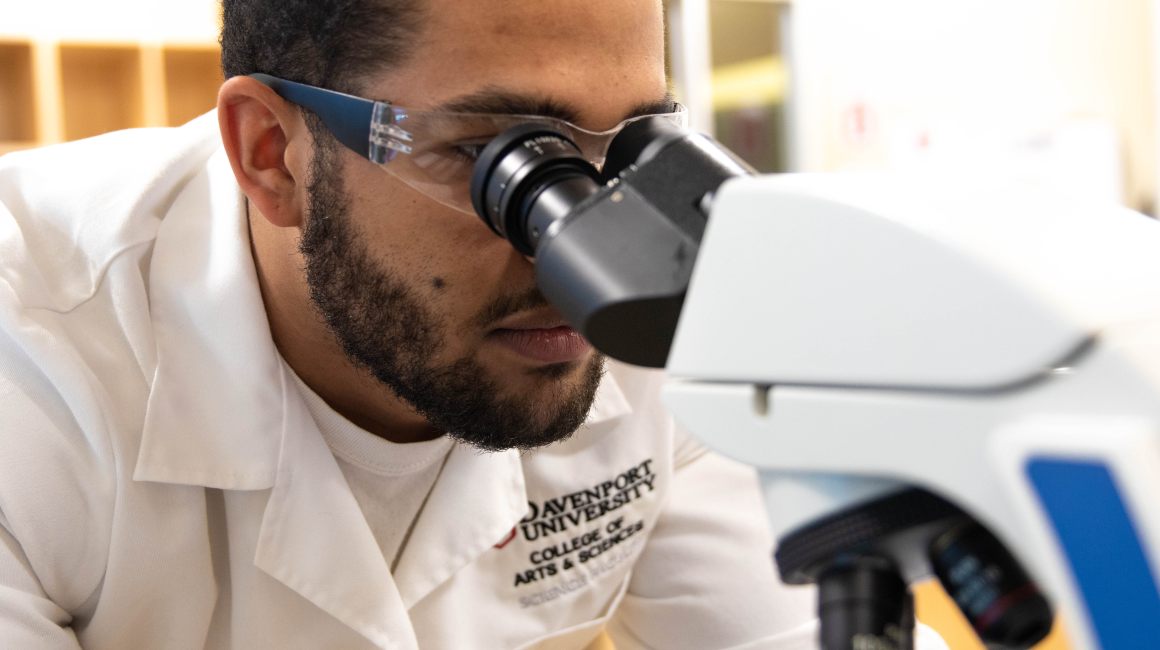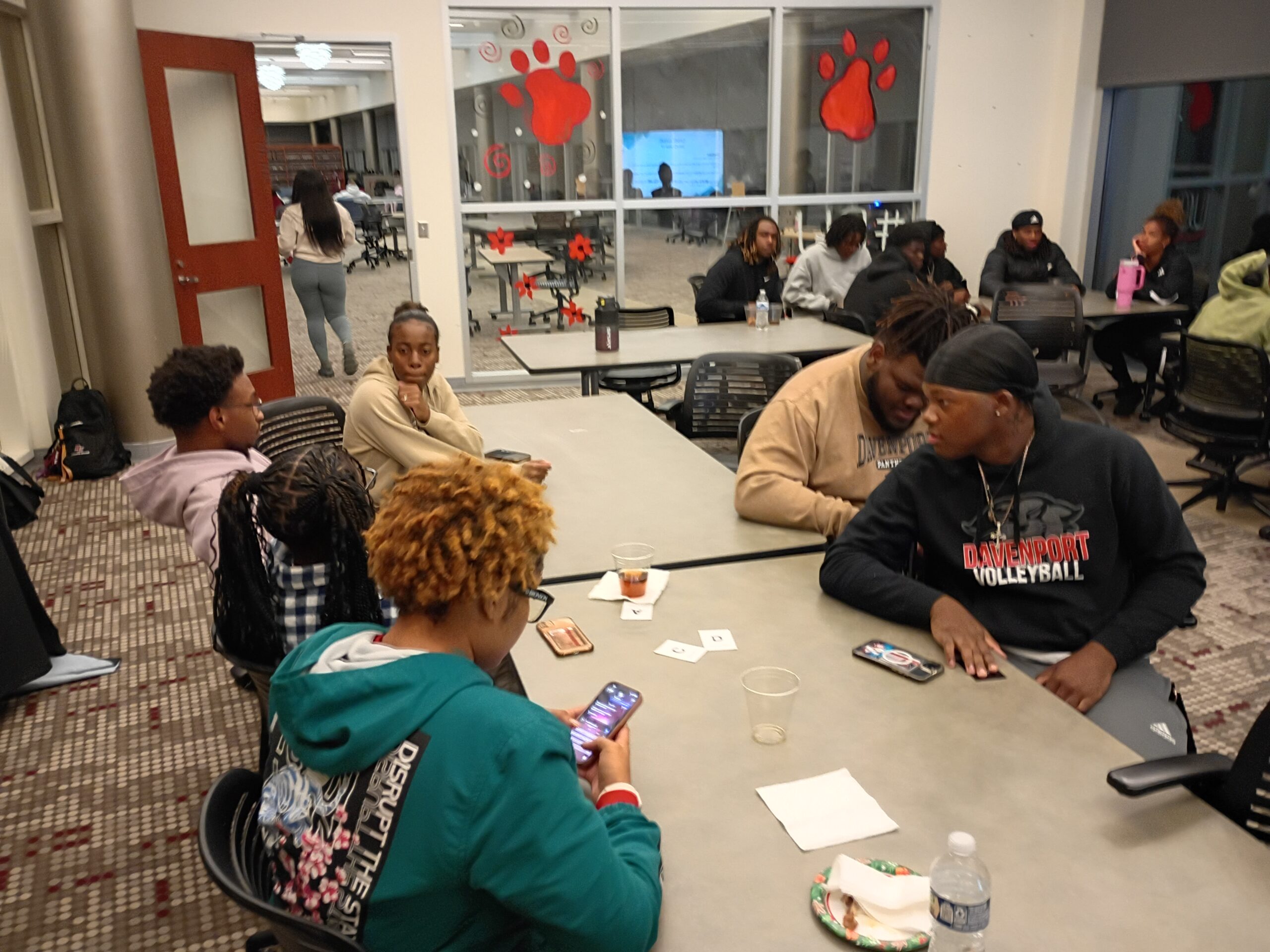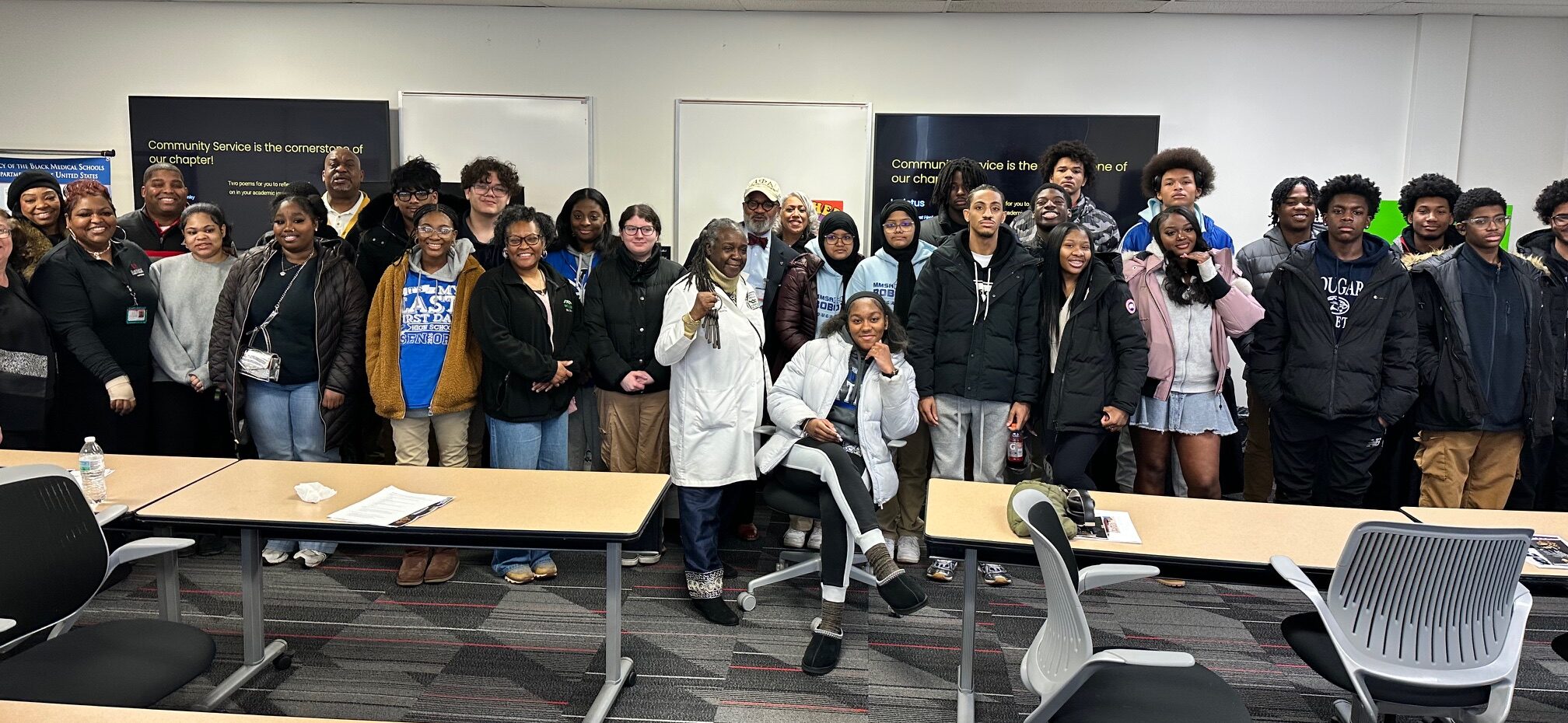5 paths you can take after earning a degree in laboratory science
Science. It’s everywhere. If you are managing a disease with medication, you can thank science. If driving in winter is easier because of the melting compound spread on the roads, thank science. You can even thank science for sticky notes and manageable hair!
If you’re interested in pursuing a career in science, a bachelor’s degree in biological laboratory science might be for you. You’ll learn techniques and methodologies used in multiple disciplines and industries, from medicine, chemistry and agriculture to technology, space exploration and even brewing beer. With so many possible applications for your learning, we encourage you to explore all of the opportunities that this degree can bring.
Industry research positions in pharmaceuticals, biotechnology, life sciences or chemistry
If you enjoy life in the lab, a research position may be just what you’re looking for. Many different industries need methodical researchers. And some of those industries may surprise you.
The pharmaceutical industry discovers, develops, produces and markets pharmaceutical drugs. These drugs are used as medications to be administered to patients to cure them, vaccinate them or alleviate their symptoms. Pharmaceutical companies may also create medical devices.
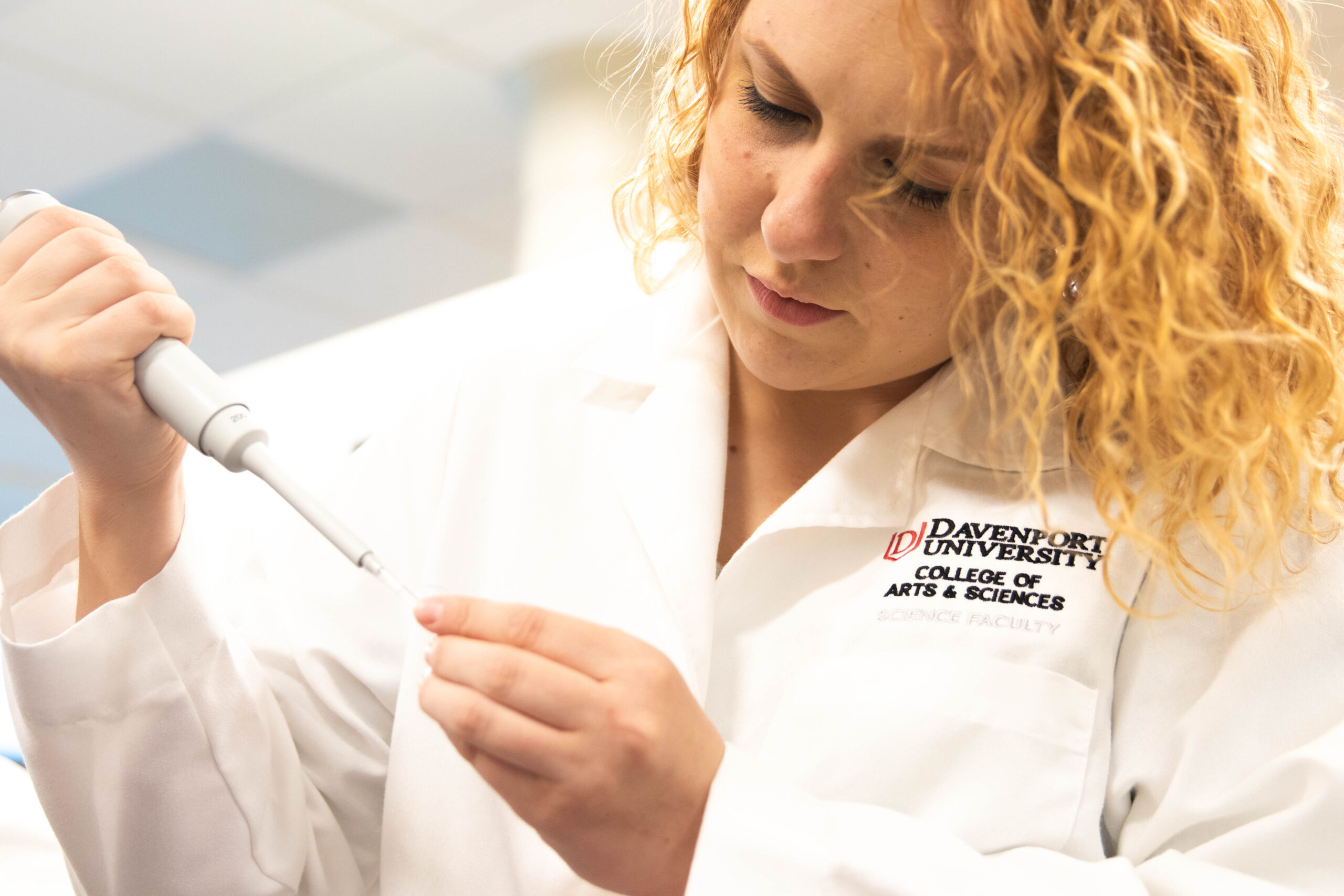
Biotechnology is a technology that utilizes biological systems and living organisms, or parts of them, to develop different products. What types of products? How about biofuels, vaccines, antibiotics, tissue engineering and beer? Yes, you read that right – beer. Brewing beer and producing antibiotics are two examples of processes that fall within the concept of biotechnology because they use microorganisms like fungi and bacteria to produce a desired product.
The branches of science that study living things are referred to as the life sciences. A scientist who works in the life sciences studies plants, animals, human beings or even tiny microscopic organisms. The specific fields of study in life sciences literally run the gamut from A (anatomy) to Z (zoology) and there are plenty of opportunities for research in these areas.
Chemistry is the study of matter, its properties, how and why substances combine or separate to form other material, and how substances interact with energy. Research chemists have been responsible for developing products that we use every day. Things like adhesives ranging from super-sticky to the glue on the back of Post-It™ notes, the silicone used in hair styling products and implants, polymers that make plastics, hydrogels that mimic tissues and salt-free ice removal products used to keep roads clear during winter.
Teaching and academic research conducted at public or private universities and schools
A career in academic research may fall into one of these areas:
- Basic research, which asks questions about how fundamental life processes work
- Clinical research, which explores how disease occurs and how it can be cured
- Population-based research, which involves tabulating data to determine how different factors such as diet, genetics and lifestyle may influence the risk of disease
Academic scientists and researchers also write applications for funding their research, write scientific papers to report the findings of their studies and present their research to other scientists at group meetings, institutional meetings and scientific conferences.
They may also teach undergraduate or graduate students about their field of study. Those with a biological laboratory sciences degree can also pursue careers teaching STEM disciplines in K-12 schools through collaboration with Davenport’s College of Urban Education.
Sales or marketing of medical devices, implants, pharmaceuticals or chemicals
If you have a love of science as well as a knack for sales or marketing, you don’t have to choose. In fact, the best members of a company’s sales force have in-depth knowledge of the product they’re selling.
Whether you’re representing a pharmaceutical company selling a new drug or device to physicians or presenting a new chemical compound to manufacturers, there are positions available for individuals who have a love for the technical side of science and the people-focus of sales and marketing.
Project management in pharmaceuticals, biotech, chemicals or food and beverage
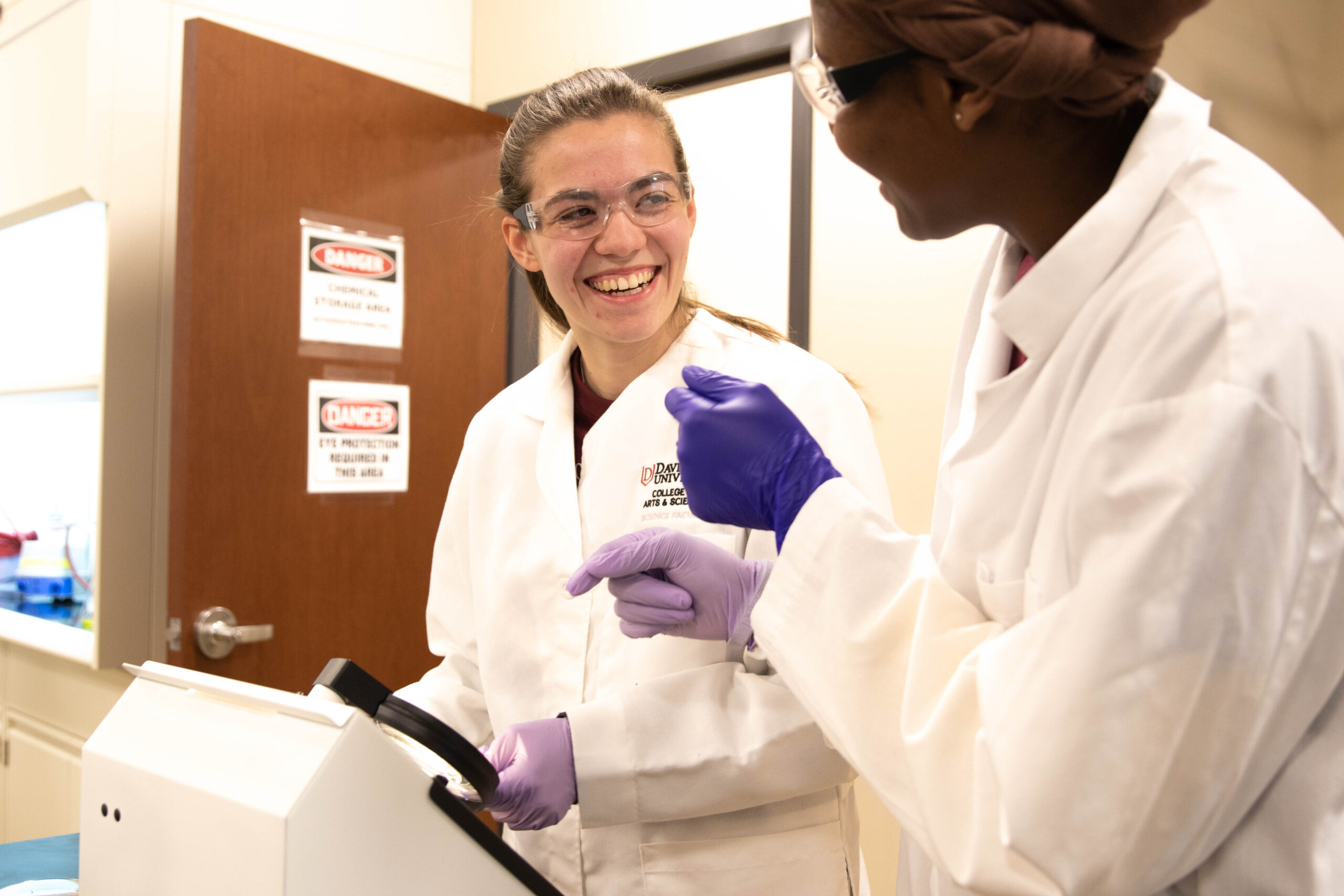
If you love new challenges and working within a specified time frame, you may want to become a project manager. Project managers with science-based backgrounds can oversee teams that are developing new chemical compounds, foods, beverages, drugs or medical devices.
Project management is the practice of initiating, planning, executing, controlling and closing the work of a team to achieve specific goals and meet success criteria at the specified time within a specified budget. You must work well with people of differing backgrounds, experiences and expertise. And, last but not least, you must be extremely organized and able to manage time and resources efficiently.
If a project involves developing something that has never existed before, project managers may also be responsible for protecting the new creation from being stolen, duplicated or copied. This can be done by the company with the new development or by a law firm. To this end, with a lab sciences degree, you could also work as a patent agent for a law firm that files patents, secures copyrights and trademarks the product or product name.
Quality control positions in pharmaceuticals, biotech, chemicals or food and beverage
Grandma may make her cookie recipe with a pinch of this and a dash of that, but this sort of guesswork isn’t acceptable in large-scale product creation. Consistent processes and repeatable results are critical in research, development and manufacturing processes. End-users, whether they are patients receiving medications or lovers of a specific beer, depend on pinpoint accuracy in the manufacturing process. And that’s where quality control comes in.
Quality control is the process through which businesses seek to ensure that product quality is maintained or improved with either reduced or zero errors. This is done by training personnel, creating benchmarks for product quality and testing products to check for statistically significant variations.
Now what?
Now that you know more about your post-graduation options after earning a degree in biological laboratory science, it’s time to find your school.
The first thing we recommend looking for is a program that combines practical and theory work with a mixture of lectures, seminars and lab work. As a lab sciences student, it’s important to note that you don’t have to take time “at the bench” for granted. Rather, you should find a college that integrates it into your learning from the very first day.
In addition to time in the lab, standout programs will prepare you for a variety of career paths. Whether you want to pursue one of the careers listed above, one that’s not listed or a postgraduate degree such as a Master of Science or Doctor of Philosophy, top colleges prepare you with the experience and education necessary to pursue the science career of your dreams. Whatever that may be.
There are many unique aspects of a lab science degree that may set one university apart from another. But with new lab equipment and simulation technology, more time spent in science classes with hands-on lab experiences, small class sizes and expert-level professors, Davenport University’s Bachelor of Science in Biological Laboratory Sciences program rises to the top of the list.
When we asked Dr. Saleela Hollingsworth, assistant professor at Davenport University, to succinctly describe the biological laboratory sciences program, she said, “At Davenport, we are creating tomorrow’s scientists today by providing the knowledge, skills and hands-on experiences necessary for success upon graduation.”
To learn more about Davenport’s lab sciences program and how we prepare the next generation of scientists, visit davenport.edu/bls.
Share This Story!
5 paths you can take after earning a degree in laboratory science
Science. It’s everywhere. If you are managing a disease with medication, you can thank science. If driving in winter is easier because of the melting compound spread on the roads, thank science. You can even thank science for sticky notes and manageable hair!
If you’re interested in pursuing a career in science, a bachelor’s degree in biological laboratory science might be for you. You’ll learn techniques and methodologies used in multiple disciplines and industries, from medicine, chemistry and agriculture to technology, space exploration and even brewing beer. With so many possible applications for your learning, we encourage you to explore all of the opportunities that this degree can bring.
Industry research positions in pharmaceuticals, biotechnology, life sciences or chemistry
If you enjoy life in the lab, a research position may be just what you’re looking for. Many different industries need methodical researchers. And some of those industries may surprise you.
The pharmaceutical industry discovers, develops, produces and markets pharmaceutical drugs. These drugs are used as medications to be administered to patients to cure them, vaccinate them or alleviate their symptoms. Pharmaceutical companies may also create medical devices.

Biotechnology is a technology that utilizes biological systems and living organisms, or parts of them, to develop different products. What types of products? How about biofuels, vaccines, antibiotics, tissue engineering and beer? Yes, you read that right – beer. Brewing beer and producing antibiotics are two examples of processes that fall within the concept of biotechnology because they use microorganisms like fungi and bacteria to produce a desired product.
The branches of science that study living things are referred to as the life sciences. A scientist who works in the life sciences studies plants, animals, human beings or even tiny microscopic organisms. The specific fields of study in life sciences literally run the gamut from A (anatomy) to Z (zoology) and there are plenty of opportunities for research in these areas.
Chemistry is the study of matter, its properties, how and why substances combine or separate to form other material, and how substances interact with energy. Research chemists have been responsible for developing products that we use every day. Things like adhesives ranging from super-sticky to the glue on the back of Post-It™ notes, the silicone used in hair styling products and implants, polymers that make plastics, hydrogels that mimic tissues and salt-free ice removal products used to keep roads clear during winter.
Teaching and academic research conducted at public or private universities and schools
A career in academic research may fall into one of these areas:
- Basic research, which asks questions about how fundamental life processes work
- Clinical research, which explores how disease occurs and how it can be cured
- Population-based research, which involves tabulating data to determine how different factors such as diet, genetics and lifestyle may influence the risk of disease
Academic scientists and researchers also write applications for funding their research, write scientific papers to report the findings of their studies and present their research to other scientists at group meetings, institutional meetings and scientific conferences.
They may also teach undergraduate or graduate students about their field of study. Those with a biological laboratory sciences degree can also pursue careers teaching STEM disciplines in K-12 schools through collaboration with Davenport’s College of Urban Education.
Sales or marketing of medical devices, implants, pharmaceuticals or chemicals
If you have a love of science as well as a knack for sales or marketing, you don’t have to choose. In fact, the best members of a company’s sales force have in-depth knowledge of the product they’re selling.
Whether you’re representing a pharmaceutical company selling a new drug or device to physicians or presenting a new chemical compound to manufacturers, there are positions available for individuals who have a love for the technical side of science and the people-focus of sales and marketing.
Project management in pharmaceuticals, biotech, chemicals or food and beverage

If you love new challenges and working within a specified time frame, you may want to become a project manager. Project managers with science-based backgrounds can oversee teams that are developing new chemical compounds, foods, beverages, drugs or medical devices.
Project management is the practice of initiating, planning, executing, controlling and closing the work of a team to achieve specific goals and meet success criteria at the specified time within a specified budget. You must work well with people of differing backgrounds, experiences and expertise. And, last but not least, you must be extremely organized and able to manage time and resources efficiently.
If a project involves developing something that has never existed before, project managers may also be responsible for protecting the new creation from being stolen, duplicated or copied. This can be done by the company with the new development or by a law firm. To this end, with a lab sciences degree, you could also work as a patent agent for a law firm that files patents, secures copyrights and trademarks the product or product name.
Quality control positions in pharmaceuticals, biotech, chemicals or food and beverage
Grandma may make her cookie recipe with a pinch of this and a dash of that, but this sort of guesswork isn’t acceptable in large-scale product creation. Consistent processes and repeatable results are critical in research, development and manufacturing processes. End-users, whether they are patients receiving medications or lovers of a specific beer, depend on pinpoint accuracy in the manufacturing process. And that’s where quality control comes in.
Quality control is the process through which businesses seek to ensure that product quality is maintained or improved with either reduced or zero errors. This is done by training personnel, creating benchmarks for product quality and testing products to check for statistically significant variations.
Now what?
Now that you know more about your post-graduation options after earning a degree in biological laboratory science, it’s time to find your school.
The first thing we recommend looking for is a program that combines practical and theory work with a mixture of lectures, seminars and lab work. As a lab sciences student, it’s important to note that you don’t have to take time “at the bench” for granted. Rather, you should find a college that integrates it into your learning from the very first day.
In addition to time in the lab, standout programs will prepare you for a variety of career paths. Whether you want to pursue one of the careers listed above, one that’s not listed or a postgraduate degree such as a Master of Science or Doctor of Philosophy, top colleges prepare you with the experience and education necessary to pursue the science career of your dreams. Whatever that may be.
There are many unique aspects of a lab science degree that may set one university apart from another. But with new lab equipment and simulation technology, more time spent in science classes with hands-on lab experiences, small class sizes and expert-level professors, Davenport University’s Bachelor of Science in Biological Laboratory Sciences program rises to the top of the list.
When we asked Dr. Saleela Hollingsworth, assistant professor at Davenport University, to succinctly describe the biological laboratory sciences program, she said, “At Davenport, we are creating tomorrow’s scientists today by providing the knowledge, skills and hands-on experiences necessary for success upon graduation.”
To learn more about Davenport’s lab sciences program and how we prepare the next generation of scientists, visit davenport.edu/bls.
Share This Story!
Stay connected!
Get the latest Davenpost News delivered to your inbox!
Related Stories
This story coincides with Mental Health Awareness Month. Two years ago, Davenport University welcomed a very special employee to campus, [...]
How one student’s journey defies the tradition in higher education While many retired professionals are basking in the Florida sun [...]
Davenport University President Richard J. Pappas told members of the Michigan House Appropriations Committee that the impact of losing the [...]
Latest Stories
The path to college isn’t always easy, and for students of color, it is often littered with roadblocks not present [...]
In recognition of Black History Month, Feb. 23 – 26, the Warren campus of Davenport University invited middle and high [...]
Davenport University President Richard J. Pappas, Ed.D., announced that Mark Peters, the CEO of Butterball Farms, Inc. has been appointed [...]

